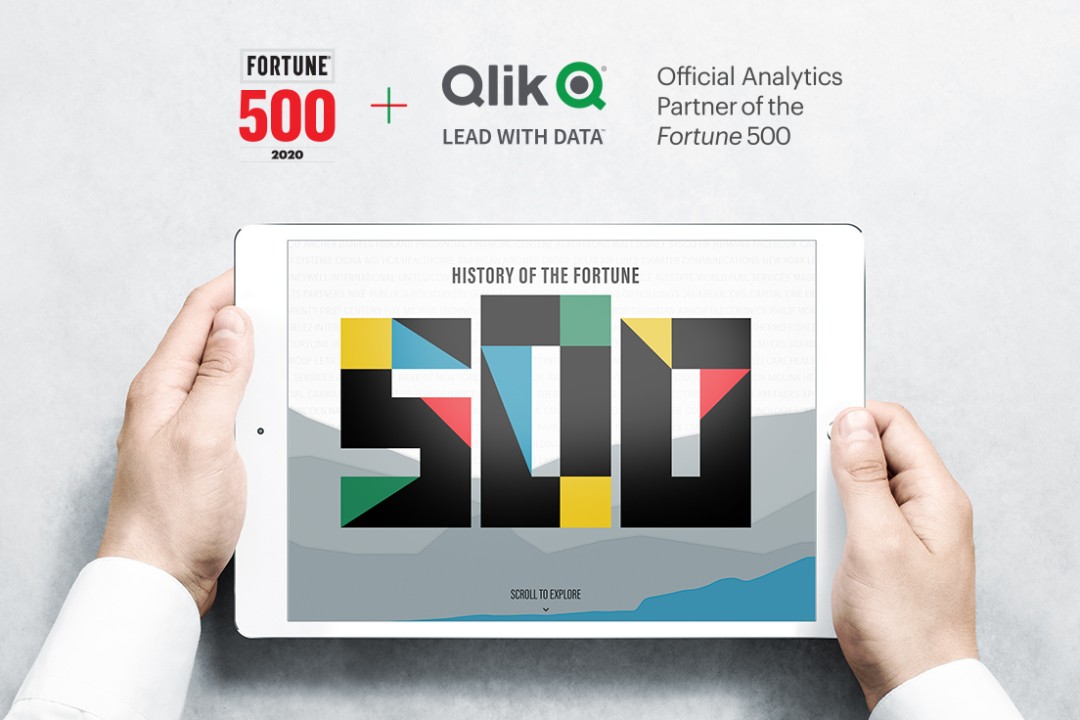
How has technology transformed the Fortune 500?
Watching the markets over the past few months, the true outlier has been the technology industry. At the close of trading on May 19, the Dow Jones Industrial Average was down 15.2% year-to-date, while the S&P 500 Index was off 9.5%. The tech-heavy Nasdaq, however, was actually up 2.4%.
Stock market winners over this period have crossed many different industries, but most have been underpinned by tech. Zoom soared through the enterprise need for video-conferencing, Amazon once again demonstrated its dominance as the e-commerce giant, and with online education platforms, like Chegg, and Telehealth providers, like Teledoc, we were able to maintain key services in our disrupted society.
Yet, the transformative impact of technology on the markets is no new trend. One way to track its evolution is in the Fortune 500. Using a new tool that Qlik built in partnership with the Fortune 500, which explore the revenues and events that shaped the success of certain industries, I’ve looked back at the rise of the tech industry over the past 25 years.
Here are some of the most interesting take-aways for the sector:
- The strong keep getting stronger – Since the addition of Services sectors to the Fortune 500 in 1995, reflecting the transformation of U.S. industry, Technology has joined a cohort of five sectors (including Financials, Energy Healthcare and Retailing) that have managed to hold onto the top spots in the industry analysis – both in the lead up to and aftermath of the Great Recession of 2008. Over this period, sector revenue for Technology rose from USD $242bn in 1995 to $1.63T 2020.
- “Software eats the world” – It’s been several years since venture capitalist, Marc Andreessen coined th phrase, but it has undoubtedly characterised the rise of Technology in the Fortune 500, with software now accounting for 21.7% of sector revenue in 2020. This reflects its growing necessity among businesses, as well its influence in our everyday lives, which comes into stark contrast with many Industrial sectors. Motor Vehicles and Parts companies, for example, stagnated so much that the Big Three (Ford, General Motors and Chrysler) were nearly wiped out in 2008.
- Technology underpins success in the Fortune 500 – Today, just 56 of those on the inaugural Fortune 500 remain. The success and survival of businesses and sectors alike has become increasingly dependent on the way in which technology has been used to innovate. For example, at a sector level, Retailing managed to both pull away from the pack thanks to shift towards e-commerce. The Internet paved the way for new competitors, like Amazon, that catalyzed a whole new way to shop.
At a company level, the continued success of General Electric (ranked 21 on the Fortune 500 in 2019) can be credited to its appreciation for innovation. The multinational conglomerate was not only the first business in the world to own a computer, but has made “surprise” market expansions into areas like renewable energy, acknowledging through its investment that it will be the future of electricity generation.
The forward-thinking company nature is perhaps unsurprising given it was founded by Thomas Edison, one of the greatest inventors in American history. However, it deserves credit for how it has maintained that culture throughout the decades, right through to the current day with its business mission of: “GE works on things that matter. Finding solutions... Building, powering, moving and curing the world. Not just imagining. Doing.”
The influence of technology in the Fortune 500 extends far beyond its own sector’s growth. It increasingly underpins the success and survival of companies across all industries – a trend I expect will only accelerate further as software disrupts an increasing number of traditional industries, like automotive and healthcare.
But you don’t need to take my word for it. Explore the data for yourself in Qlik’s History of the Fortune 500 application.